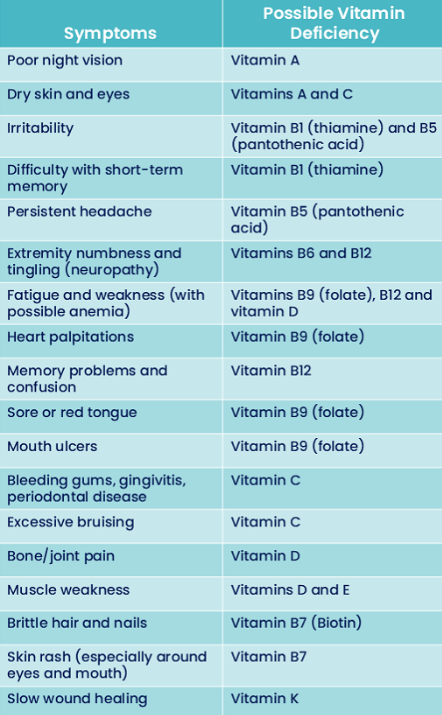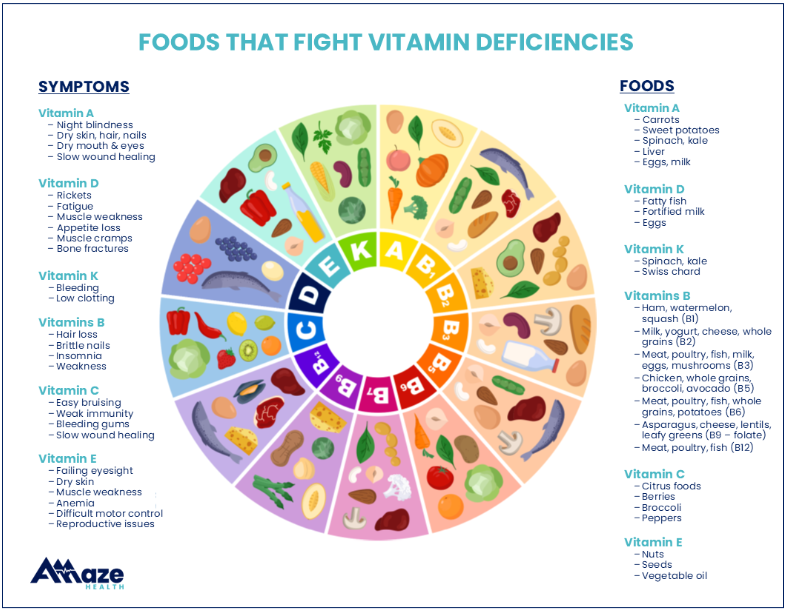
Getting Your Vitamins the Way Nature Intended
(Without Eating Like a Rabbit)
Could Make You Feel Better Fast!
Feeling a little off lately? Maybe you’re exhausted no matter how much you sleep, your nails are weak or peeling like old paint, your muscles are sore without a workout, or you seem to be developing vertigo. Before you chalk it up to getting older, too much caffeine, poor hydration, constant stress, or some horrible disease you read about online, consider this: you might be low on key vitamins.
Vitamin deficiencies are surprisingly common, and they can show up in all kinds of sneaky ways. Let’s break down what to watch for, and how to refill your tank with actual food instead of supplements.
Common Signs You Might Be Deficient in a Vitamin (Or Two, Or Three)
There are many symptoms of vitamin deficiency and most of them overlap with symptoms of other diseases and conditions. We hate to point fingers, but you know when you’re not eating right, so you might try a nutritional intervention before heading to your medical provider for testing.
If you’re constantly tired, foggy, or weak:
- Iron or B12 deficiency: Think pale skin, dizziness, and feeling like you need a nap at 10 AM.
- Fix it with: Red meat, poultry, beans, leafy greens, fortified cereals, and for B12, dairy and eggs. If you’re a plant-based eater, try nutritional yeast or fortified plant milk (oat, soy, etc.).
If your muscles cramp, twitch, or spasm randomly:
- Magnesium, calcium, or potassium deficiency: The trifecta of muscle health.
- Fix it with: Bananas, spinach, avocados, nuts, yogurt, and dairy. (Bonus: Dark chocolate is a great magnesium source. You’re welcome.)
If your skin is dry, cracked, or breakout-prone:
- Vitamin A, C, or E deficiency: Also linked to slow wound healing and brittle nails.
- Fix it with: Carrots, sweet potatoes, citrus fruits, nuts, and seeds.
If you’re very infection prone:
- Vitamin C, D, or zinc deficiency: If you’re the one always sniffling while everyone else is fine, take note.
- Fix it with: Citrus, strawberries, bell peppers (for C); salmon, eggs, and sunlight (for D); nuts, seeds, and shellfish (for zinc).
If your hair is thinning or your nails are weak:
- Biotin, iron, or omega-3 deficiency: Hair falling out in clumps? Nails flaking like croissants? These could be the culprits.
- Fix it with: Eggs, salmon, nuts, seeds, and leafy greens.
If your gums bleed easily* or your wounds heal slowly:
- Vitamin C or K deficiency: Easy bruising and slow healing could mean you’re running low. *Please note that bleeding gums could mean poor dental hygiene, which is a completely different but equally serious problem.
- Fix it with: Leafy greens, broccoli, and citrus fruits.
For a more specific symptom breakdown, we have created the chart below. If you aren’t feeling like yourself you might want to keep it handy.

How to Get What You Need—No Pills Required
Now that we’ve covered the doom and gloom, here’s the good news: you don’t need a cabinet full of supplements to fix this. Nature has already done the work—real food is packed with what you need.

The illustration above is a great cheat sheet for specific foods that target specific vitamin deficiencies. But it doesn’t hurt to review the basic principles of nutrition designed to help you avoid those deficiencies and the miserable symptoms associated with them.
How to Eat Your Vitamins
- Build a colorful plate. Bright fruits and veggies mean more vitamins. A mix of leafy greens, berries, peppers, and root veggies covers a lot of bases.
- Eat the rainbow (not Skittles, sorry). Different colors = different nutrients. Red peppers = vitamin C, orange sweet potatoes = vitamin A, green spinach = iron and magnesium, and so on.
- Don’t skip the healthy fats. Nuts, seeds, avocados, and fatty fish help your body absorb fat-soluble vitamins (A, D, E, K).
- Protein matters. Lean meats, fish, eggs, beans, and dairy are packed with B vitamins, iron, and zinc.
- Sunshine is free. Vitamin D is hard to get from food alone. If you can, aim for 10-15 minutes of sun exposure on your skin each day. (Sunscreen still wins long-term, though.)
The Bottom Line on Vitamin Deficiencies
Your body is constantly sending you signals—listen to them! If you’re feeling run down, your diet might be missing something. Skip the sketchy supplements aisle and head to the grocery store instead.
Don’t forget, only blood tests can prove that you have a vitamin deficiency, and your symptoms may be signaling something else entirely. So, if you’ve given your diet a makeover and your symptoms persist, see a medical professional.